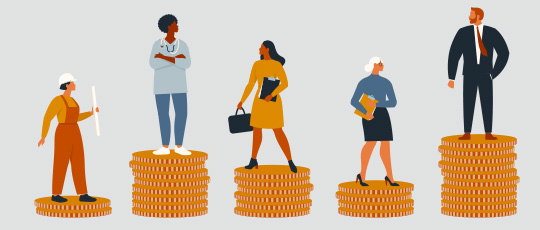The culmination of what NBC News described as a “yearslong fight for equal pay,” U.S. Soccer and the American women’s and men’s national teams have come to collective bargaining agreements (CBAs) intended “to close the gender pay gap and assure every player, man or woman, is paid equally.”
The two CBAs run through 2028, with economic terms including identical compensation for all competitions, including the FIFA World Cup and the introduction of the same commercial revenue sharing mechanism for both teams, according to a statement from U.S. Soccer, which says the agreements ensure that U.S. Soccer’s senior national team players “remain among the highest paid in the world.”
The new agreements also improve non-economic terms, including player health and safety, data privacy and “the need to balance responsibilities to both club and country,” according to U.S. Soccer.
“This is a truly historic moment. These agreements have changed the game forever here in the United States and have the potential to change the game around the world,” said U.S. Soccer President Cindy Parlow Cone.
Under the terms, World Cup prize money will also be pooled between the men’s and women’s teams and split equally among all players, representing a first in federation soccer.
“I am feeling extreme pride,” U.S. Women’s National Team defender Becky Sauerbrunn told NBC’s "Today" show. “To be able to say, finally, equal pay for equal work feels very, very good.”
JPMorgan Shareholders Disapprove of CEO's Stock Option Award
In what Reuters described as “an unusual rebuke” for JPMorgan Chase & Co. CEO Jamie Dimon, the company’s shareholders disapproved of the special $52.6 million stock option award that JPMorgan directors gave him in 2021 as an incentive for Dimon to stay on the job for at least five more years.
In an advisory say-on-pay referendum, only 31% of votes cast endorsed JPMorgan executive payments for 2021, according to a preliminary count announced at the company's annual meeting, reported Reuters, which noted that JPMorgan had won approval from more than 90% of votes cast in its annual compensation ballots in eight of the past 12 years.
Dimon will keep the award, “but such votes are closely followed as a test of investors’ attitudes toward executive pay and what payouts they will tolerate.”
In response to the vote, JPMorgan directors “pointed out through a spokesman the special award was extremely rare and the first for Dimon in more than a decade,” Reuters reported.
Directors said before the vote that the special award “reflects the board’s desire for him to continue to lead the firm for a further significant number of years,” adding that the board made the award in consideration of Dimon’s performance, his leadership since taking over as JPMorgan CEO in 2005 and his proficiency at “management succession planning amidst a highly competitive landscape for executive leadership talent.”
Intel Shareholders Vote Against Top Executives’ Compensation
According to a recently published regulatory filing, Intel shareholders have voted against the company’s compensation for its top executives, as reported by CNBC.
The vote is advisory and won’t have an immediate effect on the compensation of Intel’s executives, but it “sends a signal that some Intel investors are closely watching the performance of CEO Pat Gelsinger and the progress of his turnaround plan for the chip giant,” CNBC’s Kif Leswing wrote.
Overall, shareholders representing about 34% of the shares voted for the package, CNBC reported. Among those voting, shareholders representing about 920 million shares voted to approve, and those representing 1.77 billion voted against it, in “the latest example of shareholders voting against executive compensation packages, which can include hundreds of millions of dollars in company stock.”
Since taking over as Intel CEO in February 2021, Gelsinger has “embarked on a mission to turn Intel around, as the once-dominant chipmaker has fallen behind in manufacturing as has started to lose market share to rival AMD,” Leswing wrote. In 2021, Gelsinger received a compensation package worth more than $178 million, including more than $1 million in salary, a $1.75 million bonus, more than $140 million in stock awards and close to $30 million in option awards.
“The Compensation Committee believed that having 73% of the CEO’s new-hire equity awards contingent on achieving ambitious stock price growth was in the best interest of Intel and its stockholders,” the company noted in its proxy filing.
“The Committee took the outcome of this vote seriously and was highly focused on gathering and responding to our stockholders’ feedback regarding Intel’s executive compensation programs.”
Apple Holds Off on Return-to-Work Plans
As Yahoo! and other outlets have reported, Apple Inc. has delayed a plan that would require workers to come back to the office three days a week, citing a resurgence in COVID-19 cases.
On May 17, the tech giant informed employees that the company is holding off on the requirement, which was set to go into effect on May 23. Still, Apple is expecting employees to come to the office two days per week, saying that the three-day requirement is being set aside “for the time being,” without providing a new target date.
The company was set to oblige employees to begin working from the office on Mondays, Tuesdays and Thursdays, “a policy that had been controversial among some staff,” Yahoo! reported. “Already, employees have been coming in two days a week as part of a ramp-up effort that began in April. For now, that mandate isn’t changing.”
While the delay is COVID-related, “some Apple employees have complained about the return-to-work plan, saying it limits productivity,” Yahoo!’s Mark Gurman wrote. “They’ve said that commute time takes away hours that could be put toward their work. Employees have also complained that the office return ignored the lack of a vaccine for young children.”







